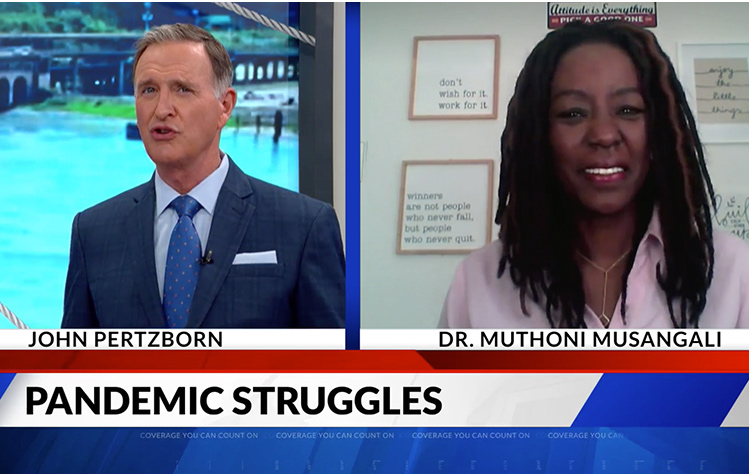Webster Faculty Expertise on Mental Health Aspects of Pandemic
April 22, 2021
Two Webster University faculty members with expertise in counseling and mental health were interviewed by local news outlets to share insight and advice on how people facing mental health challenges from the pandemic can address them, as well as how employers can help.
The COVID-19 pandemic has increased feelings of anxiety and isolation, according to a recent CDC report. To discuss these effects and how best to handle them, in lengthy interviews John Pertzborn of local TV Fox 2 spoke with Muthoni Musangali for the morning news, while separately KMOX AM radio host Amy Marxkors spoke with Jameca Woody Cooper, also for a morning news segment.
Musangali is associate professor and chair of Webster's Department of Professional Counseling.
Woody Cooper is a faculty member in Webster's School of Education.
Musangali on Fox 2
 “Covid has been with us much longer than many expected," Musangali said, which has
led to more mental health strain. "At the beginning people thought we might be working
from home for a few weeks, or maybe a few months. Here we are past a year, and people
are ‘Zoomed’ out, tired of working from home or being isolated. That can lead to decreases
in productivity and motivation as well.”
“Covid has been with us much longer than many expected," Musangali said, which has
led to more mental health strain. "At the beginning people thought we might be working
from home for a few weeks, or maybe a few months. Here we are past a year, and people
are ‘Zoomed’ out, tired of working from home or being isolated. That can lead to decreases
in productivity and motivation as well.”
“The sense of not knowing, the uncertainty of how long it is going to be. The discussion of needing a third vaccine shot or having to do one every year, it increases the sense of anxiety and also affects our productivity at work and in our home life.
Asked what people can do, Musangali stressed not being afraid to seek help or talk about it, and also to break things down to boost motivation:
“One of the things that is important to recognize is: You are not alone,” she said. “If you’re feeling less motivated, less productive, many people are going through the same things. It’s nothing to feel embarrassed about. So seek help, talk to somebody, talk to a therapist, talk to someone who can help you and recognize that this is something many, many people are experiencing. Sometimes it feels silly to seek help for something like that, but there is no shame to it.
“If you have tasks to do, break them into small tasks, create a to do list of small things. As you go through them, cross them off when you get things done. It helps to motivate you, to see your list get smaller and smaller. And it puts you in a better state of mind.”
Musangali also reminded viewers to keep a health diet and exercise, too.
The entire interview can be viewed at Fox 2 here.
Woody Cooper on KMOX
On the KMOX morning show, Woody Cooper was asked, "What is normal anymore, anyway?
 "That is such a good question,” Cooper said. “We don’t know what our new normal will
be. But we do know and what I see in my practice is that people, even if they didn’t
have COVID, are very challenged by the isolation and the social distance.
"That is such a good question,” Cooper said. “We don’t know what our new normal will
be. But we do know and what I see in my practice is that people, even if they didn’t
have COVID, are very challenged by the isolation and the social distance.
The reintroduction to social society can also raise anxiety. People are concerned about “the risk of being in large groups again, but also the expectation of having to go places, put on clothes, socialize, when they haven’t really had practice doing that in the last 12 to 15 months.”
Overall, Woody Cooper said the pandemic affects introverted and extroverted adults differently, but everyone feels the impact and will need to process the adjustment of returning to on-site work environments and other activities around people. She stressed the need for flexibility, graduated adjustment to returning to the “new normal.”
Woody Cooper added that she and other mental health providers are very busy and heavily booked right now, so if you can’t get an appointment with one, she stressed the importance of reaching out to family, friends, other support systems for dialogue, interaction and outdoor activities.
